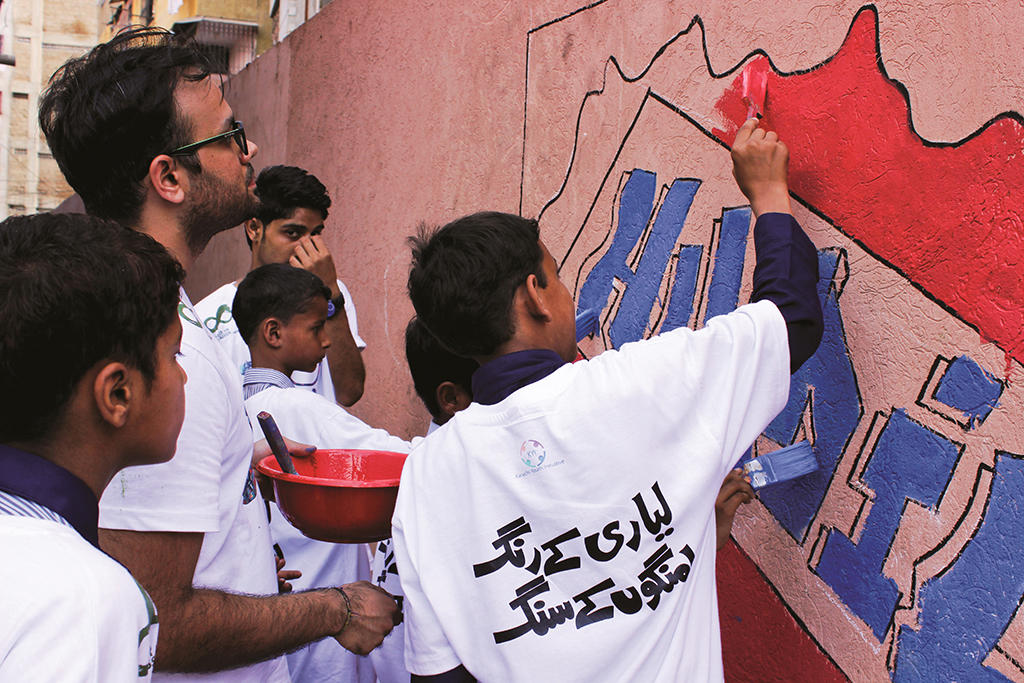The U.S. Institute of Peace supports programs and research that contribute to the mission of promoting enduring peace in South Asia. The institute provides analysis, capacity development and resources to individuals and institutions working to prevent, mitigate, and resolve violent conflict. In Pakistan, USIP awards funding in three categories, ranging from projects that test new, experimental ideas to supporting local and international organizations on policy relevant research.

The three types of funding are:
- The Peace Innovation Fund, designed to support new, experimental ideas that test creative approaches to peacebuilding.
- The Peacebuilding Practitioners’ Fund, which supports established civil society institutions.
- The Peace and Conflict Research Fund, which advances the work of local and international partners conducting policy-relevant research and writing.
See below for more details. Apply at: pakistanpeacefund.com.
Peace Innovation Fund
The Peace Innovation Fund (PIF) supports new, experimental ideas that test creative approaches to peacebuilding in Pakistan. This is a micro-award fund that seeds innovations that are cost effective and have the potential to be expanded, if successful, on a larger scale.
PIF especially focuses on support for social entrepreneurs and small organizations. Typical awardees are grassroots activists, reformers, and social enterprises whose work or ideas ultimately can be sustained through local funding and recognition.
Themes supported under PIF:
- Reclaiming public space for peaceful expression
- Increasing tolerance for diversity
The best PIF projects have the following characteristics:
- Local support
- Program can be sustained when USIP funding ends
- Cost-effective and scalable
- Experimental and innovative
- Generates learning and builds capacity for the field of peacebuilding
Peacebuilding Practitioners’ Fund
The Peacebuilding Practitioners’ Fund (PPF) seeks to support established civil society institutions working to prevent, mitigate, and resolve violent conflict in Pakistan. The fund is designed to: a) promote tolerance of diversity among the country’s political, ethnic and religious communities; and b) build the capacity of state and civil society institutions to prevent, mitigate, and resolve violent conflict.
PPF works with both for-profit and non-profit organizations that are legally registered in Pakistan. Typical awardees under PPF are civil society organizations or educational institutions with prior experience in peacebuilding and/or conflict resolution. They have strong local networks and have capacity to manage international donor funding. Projects under the PPF must have robust design, including a plan for monitoring and evaluation, and a sustainability strategy.
Themes supported under PPF:
- Promoting messages for peace and against political, religious, ethnic, or criminal violence through media, art, and technology.
- Supporting peace education initiatives in public and private schools, madrassas, and institutions of higher education.
- Supporting locally relevant ideas for facilitating and mediating inter-faith and intra-faith dialogue.
- Amplifying the voice and role of women in peacebuilding and conflict resolution.
- Developing guidelines and advocating for change that enhances the performance of the police and criminal justice system.
The best PPF projects have the following characteristics:
- Likelihood of impact and an effective plan to measure results
- Cost-effective and scalable
- Program can be sustained when USIP funding ends
- Generates learning and builds capacity for the field of peacebuilding
Peace and Conflict Research Fund
The Peace and Conflict Research Fund (PCRF) supports the work of local and international partners conducting policy-relevant research and writing on issues related to peace and conflict in Pakistan and the surrounding region. Studies carried out under the fund are intended to inform audiences in Washington, Islamabad, and around the world about the most critical factors contributing to violent conflict in Pakistan and the most important priorities to help mitigate or resolve those conflicts.
PCRF-supported studies are sometimes published through the auspices of the partner organization, or under one of three standard USIP publication formats - PeaceWorks (major 20,000-word studies of enduring relevance), Special Reports (standard 10,000-word issue studies), or PeaceBriefs (short 2,000-word policy memos). Book proposals are generally not supported at this time. To view recent USIP publications on Pakistan, please visit this link.
Typical awardees under the PCRF are practitioners or academics with an established record of concise, analytic writing for public policy audiences, but junior scholars and analysts are also encouraged to apply. Both desk-based research and field studies are supported by the PCRF.
Themes supported under PCRF:
- Conflict drivers: Analysis focused on structural/political economy factors that can contribute to violent conflict in particular geographic regions or the country writ large.
- Radicalization and violent extremism: Analysis focused specifically on understanding factors that drive individuals or groups to participate in violent conflict.
- Specific issue priorities: Youth education and radicalization; sectarian conflict.
- Regional conflict dynamics: Analysis focused on Pakistan’s political, security, economic, and environmental relations with its regional neighbors and international partners, and the impact on Pakistan’s internal and external security.
- State security policy: Analysis focused specifically on the state response to internal and external security threats – how policy is made, assessing policies, and recommendations.
- Specific issue priorities: counter-terrorism policy; policing, civil-military relations.
- Governance and public policy: Analysis focused on Pakistan’s political dynamics and public policy issues, and how they impact conflict or external relations.
- Specific issue priorities: Elections, political participation, and election violence; natural resources extraction, water- and energy service delivery, and associated conflict management practices.
The best PCRF projects have the following characteristics:
- Rigorous analysis of factors contributing to peace or conflict in Pakistan
- Lessons from field observation or practice (including comparative experience from other countries and contexts applied to Pakistan)
- Clear and concise guidance for policymakers




